When I started my non profit, the Flawless Foundation, one of the first organizations I got to know was the One Mind Institute. In particular, One Mind’s founders, the Staglin family, went out of their way to help us get off the ground by introducing us to Patrick Kennedy and working with us on our gala. Because my experience with the Staglins has always been characterized by this collaborative, inclusive spirit, I wasn’t surprised to hear of their latest partnership with our Flawless advisory board member, Chantel Garrett and her organization Partners for StrongMinds. As the mental health advocacy community redoubles our efforts during this month of focused awareness on our cause, examples like this merger are important reminders of how strong we can be when we work together.
The result of this merger is a new program called One Mind Care Connect, a research initiative that seeks to connect people to earlier, improved treatment and support for brain disorders. The program’s initial projects include Strong 365, an innovative digital resource aimed at connecting young people in the early stages of psychosis to information and treatment. In this new project, Chantel and the Staglins are harnessing and combining the strengths of their individual organizations to achieve their most important and shared goal: to help individuals and families living with disorders of the brain.

Brandon Staglin, Director of Marketing and Communications at One Mind Institute, described the synergy they are hoping to create with the project: “As someone who has experienced psychosis and recovery thanks to early intervention, and a proponent of One Mind Institute’s collaborative mission, I am thrilled Strong 365 is now a program of One Mind Institute. Strong 365’s cutting-edge research on connecting at-risk youth to care beautifully complements One Mind Institute’s focus on science to enhance predictive diagnostics and treatments for early psychosis. Together we will help at-risk youth get the care they need, and make that care even better over time.”
We recently heard Chantel speak on a panel about the new generation of advocacy at the National Council on Behavioral Health’s annual conference, and also sat down with her to hear more about her work. She shared some of the principles she follows when looking for opportunities to collaborate.

Look for win-wins.
While you may have slightly different objectives, the key to successful collaboration is identifying the places where there is a natural synergy of complementary strengths. For example, while One Mind Institute’s focus has always been funding brain health research, Partners for StrongMinds’ strengths are in public education and outreach, and drawing on the expertise of each team makes both efforts stronger. Chantel doesn’t deny that this can be challenging: “It’s not quite as easy as simply identifying a shared mission. Effective partnerships require you to genuinely assess your strengths, opportunities, weaknesses, and focus areas. With that as a foundation, you can learn to leverage a collaboration so that both teams benefit, and both are working smarter and achieving their end-goals,” she said. She emphasizes the importance of communicating your organization’s needs clearly, and asking questions to tap into those of the other organization.
Know what you stand for and how you communicate that to your audience.
Working with a partner — whether through sponsoring an event, guest blogging, co-branding or marketing efforts, or merging initiatives — is a direct extension of your brand. Smart collaborations help to enrich your brand platform by linking to a brand that echoes your own core beliefs and messages, ideally to a target audience you wouldn’t have otherwise reached. Language is powerful, especially the language of mental health advocacy, which can sometimes feel like a minefield. When working with partners, it’s important to agree on messaging and, depending on the initiative, agree on the voice of a shared product.
Seek out forums for collaboration.
Chantel believes we need more of these in the mental health advocacy space, as they are essential for identifying others who share our goals, as well as sharing best practices. This is one of our top values and principles at the Flawless Foundation and we find that when we connect and convene with others who are dedicated to the same cause we not only benefit from shared wisdom but also build enthusiasm and goodwill.
In May, Mental Health Awareness Month, it’s important to keep in mind the power of working together and combining our voices. Chantel described the opportunity we have to increase awareness and promote prevention, saying: “Ensuring that young people get the help they need when it matters most — at the earliest outset — will take a national movement of diverse players across sectors working together, pushing for increased funding, awareness and policy change with the same message: that we can and therefore have a responsibility to greatly transform and save lives by connecting people to effective care. It is so much bigger than one group of any kind. It will take all of us — individuals raising their voices, government agencies, corporations and nonprofits collaborating on this issue. It will also require a broad social movement to develop a new vocabulary and create space in our homes, schools and communities to talk openly about emotional and mental wellbeing.”
With fragmentation in the mental health arena, there are many opportunities for building scale and strength through innovative partnerships. With Strong 365, our Flawless colleagues will reach more people and have a greater impact than they would be able to alone, and we are looking forward to supporting them in this exciting and important collaboration.







